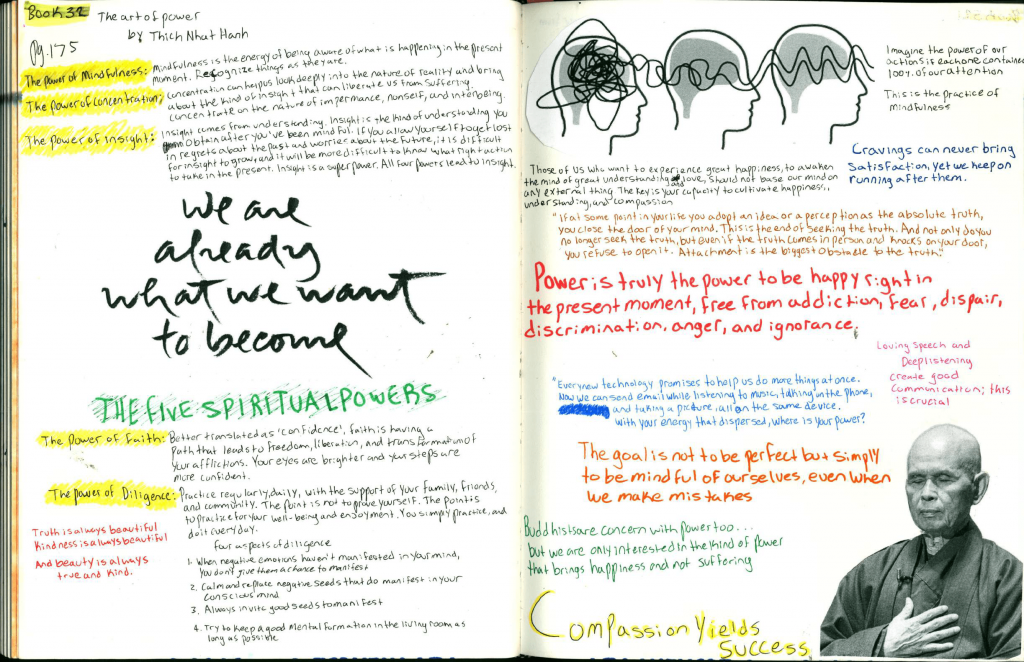The Art of Power by Thich Nhat Hanh
Posted on
The Art of Power by Thich Nhat Hanh
The Essence
Meditation Master Thich Nhat Hanh redefines how we think about power. Power thought as fame, fortune, success, or strength limits our understanding of the concept. A greater power is available to each of us, and that is the power to be here now in the present moment. We can be free from anger, hatred, addiction, and ignorance if we accept and cultivate mindfulness into our lives. The quality of our lives can be transformed by incorporating the Five Spiritual Powers. True power really comes from within.
The Art of Power Journal Entry Notes:
This is my book summary of The Art of Power. My notes are a reflection of the journal write up above. Written informally, the notes contain a mesh and mix of quotes and my own thoughts on the book. Sometimes, to my own fault, quotes are interlaced with my own words. Though rest assured, I am not attempting to take any credit for the main ideas below. The Journal write up includes important messages and crucial passages from the book.
The Five Spiritual Powers
The Power of Mindfulness: Mindfulness is the energy of being aware of what is happening in the present moment. Recognize things as they are.
The Power of Concentration: Concentration helps us to look deeply into the nature of reality and bring about the kind of insight that can liberate us from suffering. Concentrate on the nature of impermanence, nonself, and interbeing.
The Power of Faith: Better translated as ‘confidence’, faith is having a path that leads to freedom, liberation, and transformation of your afflictions. Your eyes are brighter, and your steps are more confident.
The Power of Diligence: Practice regularly, daily, with the support of your family, friends, and community. The point is not to prove yourself. The point is to practice for your well-being and enjoyment. You simply practice and do it every day.
Four aspects of Diligence
1. When negative emotions haven’t manifested in your mind, don’t give them a chance to manifest.
2. Calm and replace negative seeds that do not manifest in your conscious mind.
3. Always invite good seeds to manifest.
4. Try to keep a good mental formation in the living room as long as possible.
The Power of Insight: Insight comes from understanding. Insight is the kind of understanding you obtain after you’ve been mindful. If you allow yourself to fell lost in regrets about the past and worries about the future, it is difficult for insight to grow and it will be more difficult to know what right action to take in the resent. Insight is a superpower. All four powers lead to insight.
• Truth is always beautiful
• Kindness is always beautiful
• And Beauty is always true and kind
• Imagine the power of our actions if each one contained 100%of our attention. This is the practice of mindfulness.
• Cravings can never bring satisfaction, yet we keep on running after them.
• Those of us who want experience great happiness, to awaken the mind of great understanding and love, should not base our mind on any external thing. The key is your capacity to cultivate happiness, understanding, and compassion.
• “If at some point in your life you adopt an idea or a perception as the absolute truth, you close the door of your mind. This is the end of seeking the truth. And not only do you no longer seek the truth, but even if the truth comes in person and knocks on your door, you refuse to open it. Attachment is the biggest obstacle to the truth”
• Power is truly the power to be happy right in the present moment, free from addiction, fear, despair, discrimination, anger, and ignorance.
• Loving speech and deep listening create good communication; this is crucial.
• “Every new technology promises to help us do more things at once. Now we can send email while listening to music, taking on the phone, and taking a picture, all on the same device. With your energy that dispersed, where is your power?”
• Loving speech and deep listening create good communication; this is crucial.
• The goal is not to be perfect but simply to be mindful of ourselves, even when we make mistakes.
• Buddhist are concerned with power too… but we are only interested in the kind of power that brings happiness and not suffering.
• Compassion yields success.
If you liked what you saw. Here are 3 titles that I recommend based on what was discussed in The Art of Power.
- How to Fight by Thich Nhat Hanh
- The Miracle of Mindfulness: An Introduction to the Practice of Meditation by Thich Nhat Hanh
- Wherever You Go, There You Are: Mindfulness Meditation in Everyday Life by Jon Kabat-Zinn
Find the book on Amazon: Print | Audio
Check Out More 52 in 52 Challenge Summaries
Note: This page contains affiliate links. This means that if you decide to buy a product through them, I will receive a small commission. This has no additional cost to you. If you would like to support Forces of Habit, please use these links. If you do use them, thank you for the support.


